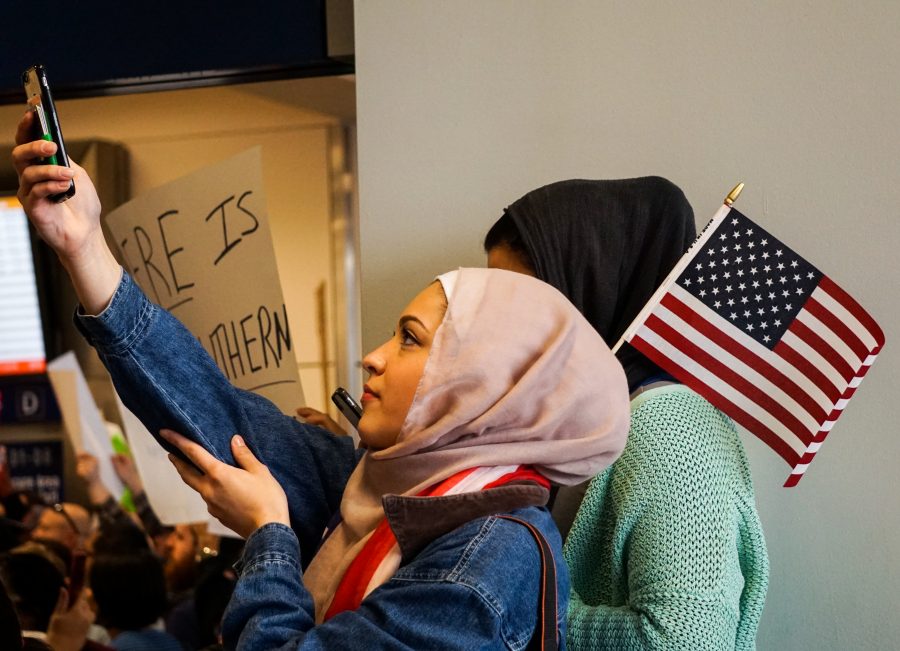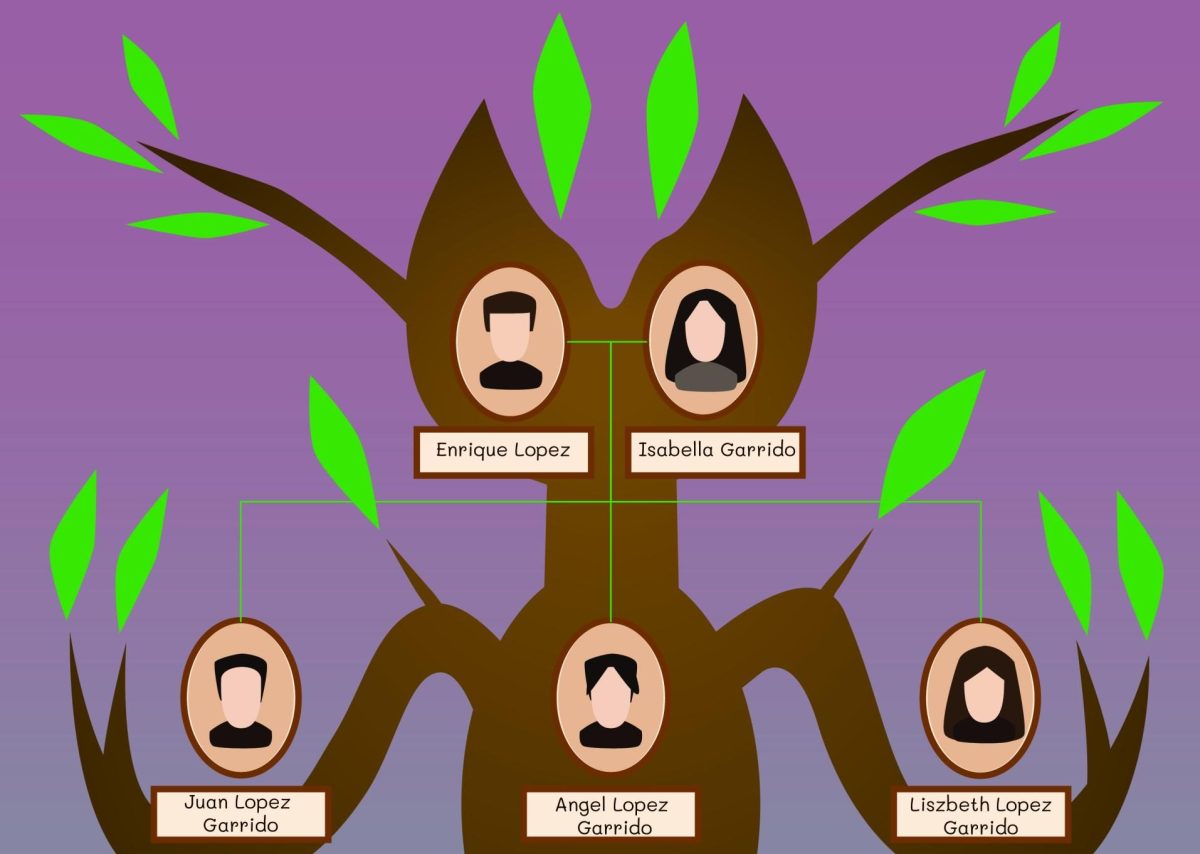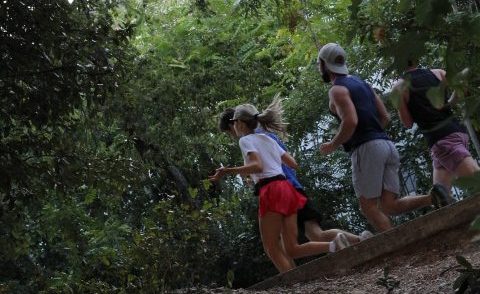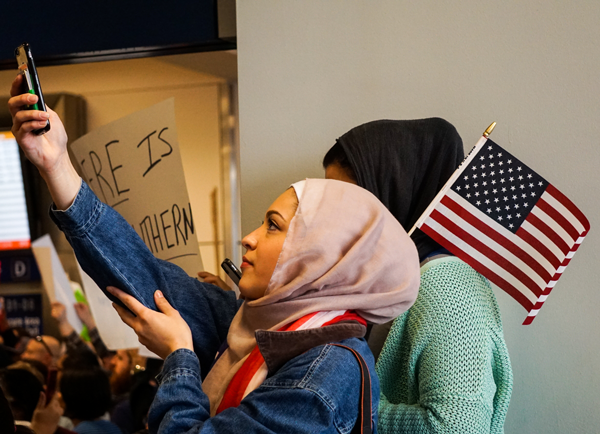
By KATRINA BOND
@KatBondETC
Editor’s Note: On Feb. 9 federal appeals court unanimously rejected the Trump administration’s request to allow the travel ban to take effect.
Terminal D, Gate 22 at DFW International Airport was mostly empty Jan. 31 except for some signs placed on the railings, one reading “Hate has no home here.” There were five protestors, standing about and comforting the two families of passengers who had been detained.
This was a very different scene from two days before, when hundreds of people stood close together, holding signs, chanting in multiple languages “the people united will never be divided” and passing around water and pizza boxes as they waited for nine detainees to be released.
“It was a really positive atmosphere, despite this really horrible thing that was going on,” said English professor Elise Matthews, who attended the protest on Jan. 29. “It was cool to see the community come together that way and be really supportive of each other.”
President Donald Trump signed an executive order Jan. 27 barring citizens of Iran, Iraq, Libya, Somalia, Sudan, Syria and Yemen from entering the United States for 90 days. The order indefinitely refuses entry to Syrian refugees and denies all other refugees for 120 days.
James Robart of Federal District Court in Seattle reversed Trump’s order Feb. 3, suspending the travel ban. The Department of Justice tried to reinstate the travel ban, but the Circuit Court of Appeals in San Francisco denied the emergency appeal on Feb. 5.
With the order suspended, travel to and from the seven countries resumed. Legal briefs were submitted to the appeals court at 6 p.m. Feb. 6. A ruling was pending at press time.
There are 47 students in the Dallas County Community College District who were and still could be affected by the order. The Et Cetera identified at least two who attend Eastfield. The college was unable to provide a count of affected students.
Chancellor Joe May said the district would attempt to help impacted students.
“About the only way they can find out the impact of them at this time is if they make an attempt to leave the country,” he said.
May sympathized with students who were afraid to inquire about the order, lest they reveal information that could endanger them.
“What happens in that environment is unknown [and] creates fear,” May said.
Other colleges across Texas are also concerned with how the order will affect students. At the University of Texas at Austin, 110 students and faculty have been affected, and the university warned them not to cross or approach the border between the United States and Mexico.
According to NPR, about 17,000 students in the U.S. are impacted by the travel ban.
Almost immediately after the order was signed, airports began turning away flights and detaining passengers. Security began interviewing people flying to the U.S. from the seven predominantly Muslim countries listed in the order.
About 50 people were detained Jan. 28 at DFW Airport, and nine were detained the following day. On Jan. 30, a wounded soldier who had been coming home from Iraq was released after being detained for 15 hours.
Professor Andrew Tolle, who protested Jan. 28-30, saw the families as they waited and as their family members were released.
“I actually met the people whose families were behind those doors and could not come out,” Tolle said. “It’s very hard once you see human faces, eyes looking into your eyes, to not understand this is a human issue, rather than some bureaucratic issue.”
On Jan. 31, eight people were detained from a flight from Qatar after it landed at 2:30 p.m.
Al Masri waited for five hours for his brother, Ahmad Al Mansoor, to be released. Al Mansoor has a valid U.S. visa.
Volunteer lawyers have been stationed at Terminal D since Jan. 28, when more than 100 lawyers offered free legal services to detainees and their families. Some waited for more than
15 hours to see if their family members were released or deported.
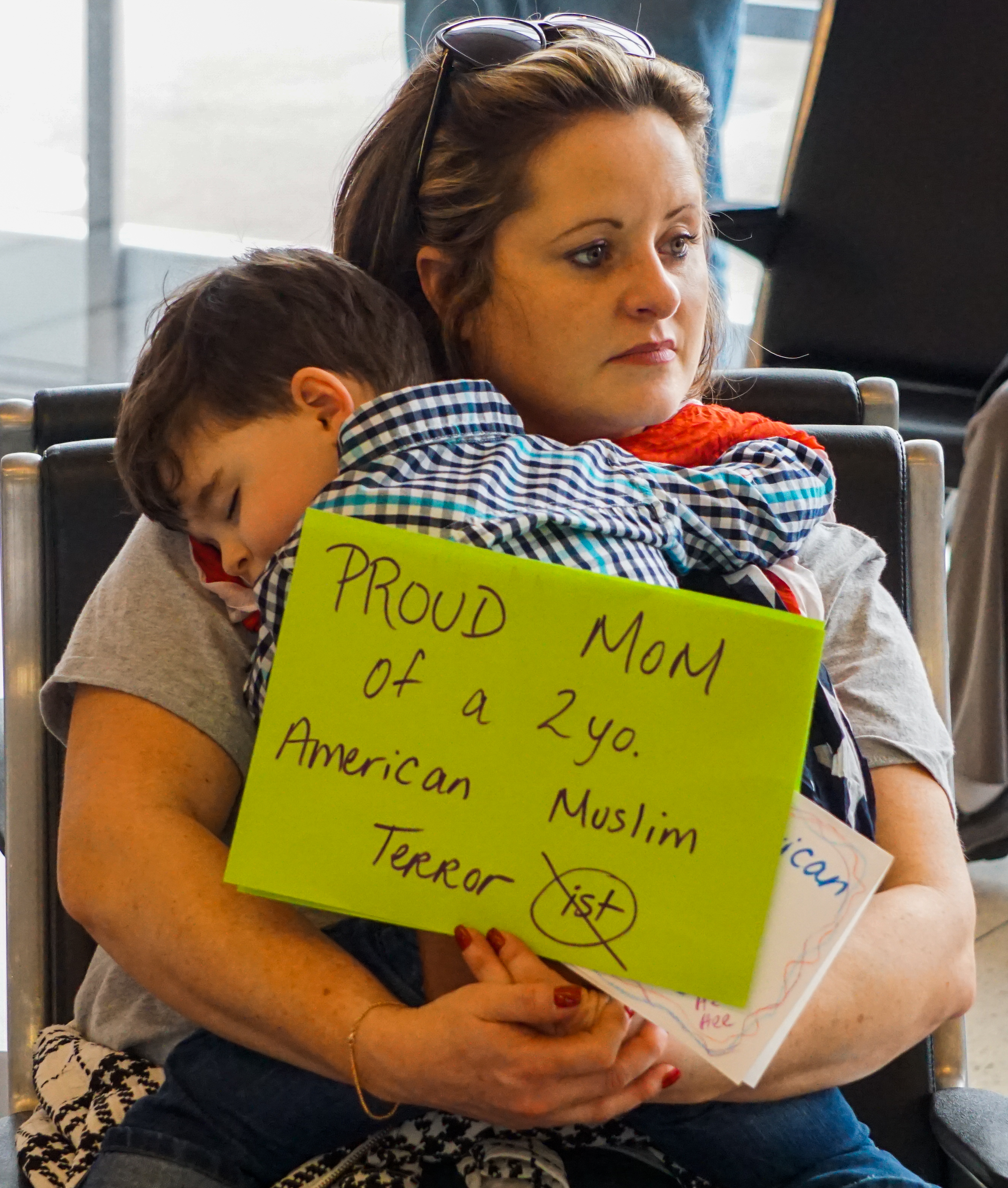
“All of us here are here on our own time, for free,” attorney Peter Schulte said. “We’re not receiving any compensation. When you have something like this, an executive order that we feel, as legal scholars, is unconstitutional on its face, the concern is, ‘what’s next?’ If we don’t stop the administration on this, what’s going to happen to regular citizens?
Although the number of lawyers stationed at Terminal D dropped as the week went on, Schulte confirmed that there would always be lawyers offering their services pro bono as long as the ban stayed in place.
“We’re going to be here,” he said. “We’re here for the long haul. Things may quiet today because it’s a slower travel day, but we’re not leaving. We’re staying here until the courts rule that the executive order is unconstitutional, or there’s more guidance that they’re going to rescind that.”
Shulte was one of six lawyers working to help Al Mansoor. The lawyers are gathering information about the detainees as family members come to them. Masri did not approach anyone until after he waited two hours for his brother.
“If they have been back there for more than four hours, that’s when we start our process,” Schulte said, referring to the contacting of federal judges and issuing a writ of habeas corpus, or an order to send a detained individual to the court issuing the order.
In cases of the latter, airport security released detainees to their families within the hour.
“We’ve been seeing that pattern over and over again,” Schulte said. “We feel like they are completely avoiding trying to get these cases in front of a federal judge.”
Eastfield students and faculty were among the protestors at DFW airport on Jan 30, including professors Tolle, Matthews, Shazia Ali and Kat Reguero,.
“I went to the airport to show solidarity with the people who are being detained because they are legal residents, they have legal visas,” Ali said. “I think, at some point, you have to take a stand and support others who are being unfairly stopped at the airport.”
Ali is Muslim like many of the detainees and has been stopped at airports and asked to go through extra security. Although she has never been detained, she has sympathy for these families.
Reguero has participated in a number of similar protests before. She said immigration issues are very important to her, and she believes that she has an obligation to protest this executive order.
[READ MORE: Generations stand together to protect native land]
“For me, it’s not a blue and red thing,” she said. “It’s not liberal [or] conservative. It’s human rights. Whenever human rights are violated, that’s when I have a problem.”
Ali was pleased with the protest. She felt there was a lot of hope there.
“That’s the beauty of the country, that you can have that kind of protest in a public place, in an airport, and everyone is there,” she said. “It was very heartwarming, a very inclusive affair. It was symbolic of what America stands for, which is diversity.”
Although the order is currently suspended, Tolle does not believe it will stay that way.
“We’re going to have to probably protest again,” Tolle said. “I think this administration is very intent on doing this regardless of what the court has said, and [Trump] has already said that he doesn’t think the court has any say here.”
15 hours to see if their family members had been released or deported.
“All of us here are here on our own time, for free,” attorney Peter Schulte said. “We’re not receiving any compensation. When you have something like this, an executive order that we feel, as legal scholars, is unconstitutional on its face, the concern is, ‘What’s next?’ If we don’t stop the administration on this, what’s going to happen to regular citizens?
Although the number of lawyers stationed at Terminal D dropped as the week went on, Schulte confirmed that there would always be lawyers offering their services pro bono as long as the ban stayed in place.
“We’re going to be here,” he said. “We’re here for the long haul. Things may quiet today because it’s a slower travel day, but we’re not leaving. We’re staying here until the courts rule that the executive order is unconstitutional, or there’s more guidance that they’re going to rescind that.”
Shulte was one of six lawyers working to help Al Mansoor. The lawyers are gathering information about the detainees as family members come to them.
Masri did not approach anyone until after he waited two hours for his brother.
“If they have been back there for more than four hours, that’s when we start our process,” Schulte said, referring to the contacting of federal judges and issuing a writ of habeas corpus, or an order to send a detained individual to the court issuing the order.
In cases of the latter, airport security released detainees to their families within the hour.
“We’ve been seeing that pattern over and over again,” Schulte said. “We feel like they are completely avoiding trying to get these cases in front of a federal judge.”
Eastfield students and faculty were among the protestors at DFW Airport on Jan. 30, including professors Tolle, Matthews, Shazia Ali and Kat Reguero.

“I went to the airport to show solidarity with the people who are being detained because they are legal residents, they have legal visas,” Ali said. “I think, at some point, you have to take a stand and support others who are being unfairly stopped at the airport.”
Ali is Muslim like many of the detainees and has been stopped at airports and asked to go through extra security. Although she has never been detained, she has sympathy for these families.
Reguero has participated in a number of similar protests before. She said immigration issues are very important to her, and she believes that she has an obligation to protest this executive order.
“For me, it’s not a blue and red thing,” she said. “It’s not liberal [or] conservative. It’s human rights. Whenever human rights are violated, that’s when I have a problem.”
Ali was pleased with the protest. She felt there was a lot of hope there.
“That’s the beauty of the country, that you can have that kind of protest in a public place, in an airport, and everyone is there,” she said. “It was very heartwarming, a very inclusive affair. It was symbolic of what America stands for, which is diversity.”
Although the order is currently suspended, Tolle does not believe it will stay that way.
“We’re going to have to probably protest again,” Tolle said. “I think this administration is very intent on doing this regardless of what the court has said, and [Trump] has already said that he doesn’t think the court has any say here.”
https://eastfieldnews.com/2016/12/07/recovery-continues-year-after-tornadoes/


